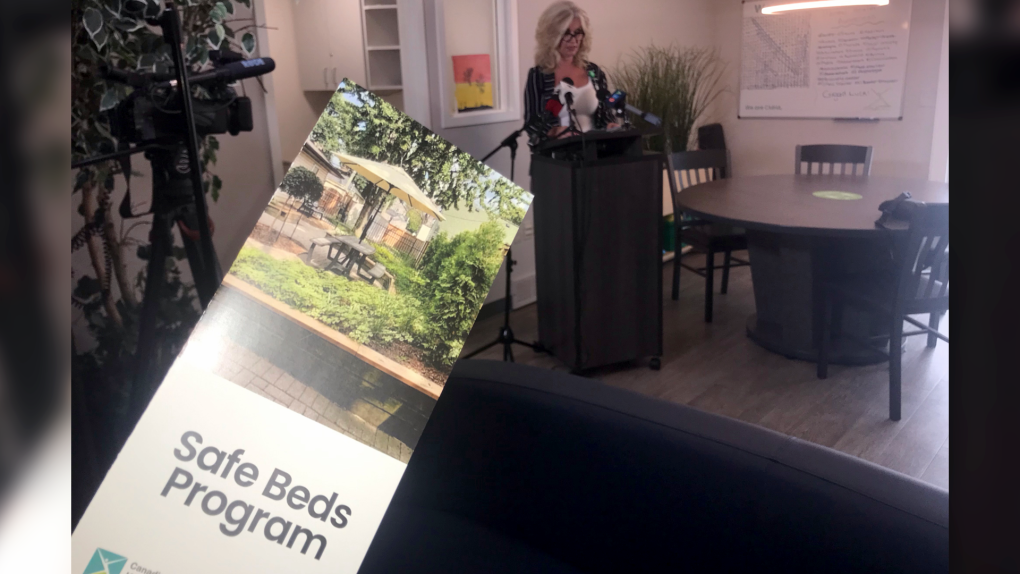'I couldn’t do it alone': How Safe Beds is changing lives in Windsor
The Canadian Mental Health Association (CMHA) has been quietly operating a residential crisis intervention program for more than three years.
“I’d probably be homeless right now, maybe using [drugs], definitely wouldn't have my job,” a former client told CTV News Wednesday.
The 39-year-old, who wished to remain anonymous, admitted he struggles with substance abuse and a gambling addiction and found himself homeless after a “toxic” relationship ended.
He moved into the facility in downtown Windsor two months ago and has since turned his life around.
“All the problems and the trauma from my past really funneled into why I was using in the first place,” he said. “I ended up banning myself from online poker and from the casino. And I really took those steps with [Safe Beds’] support. I couldn't do it alone.”
Safe Beds, a short-term crisis accommodation support program, opened in early 2020. In fall 2022, it expanded to a 24/7 operation.
In the last 11 months alone, Safe Beds has supported more than 100 people who are “experiencing homelessness and having direct contact with police”, program supervisor Zoey Azlen explained to CTV News.
“We're [a] crisis based program so we can't have a waitlist. It's an immediate need. Someone is having a crisis in the community and police are calling us right then and there,” she said.
If they are eligible for the program, clients can stay for up to 30 days.
They live in one of four private bedrooms with access to all other amenities you’d expect in a home.
 Sonja Grbevski, CEO of CMHA-WECB hosted an open house on July 12, 2023 at Safe Beds in Windsor. (Michelle Maluske/CTV News Windsor)
Sonja Grbevski, CEO of CMHA-WECB hosted an open house on July 12, 2023 at Safe Beds in Windsor. (Michelle Maluske/CTV News Windsor)
They work with an addictions specialist, a peer support worker, and residential support workers to stabilize the initial crisis, develop goals for health and addictions, and they are connected with community supports.
All the while, the team is trying to secure new housing for their clients.
“Whether that be independent housing, supportive housing, rest homes, maybe a long term shelter, a treatment [facility] or reconnection with family and friends,” said Azlen.
Addictions specialist Mehak Sandhu was hired in January 2023, “because we identified that around 80 to 90 per cent of the population who come and join us here at Safe Beds, identify substance use as a concern for themselves.”
Sandhu will work one-on-one or in a group setting to help the clients come to terms with the reason for their substance abuse and to find coping strategies.
And if they aren’t ready to quit completely, Safe Beds will provide advice on safe supply and consumption, although clients are not permitted to use illegal drugs on the premises.
If, after the 30 days are up and they have been engaged in programming, but a client’s new housing isn’t ready, they have a “step down unit”.
“We'll let them stay in the step down unit for 10 or 11 days until they're able to get into their housing and it really allows them to foster some skills and transition from that supportive housing to the independent housing,” said Kolby Phillips, residential support worker.
Most of the referrals to Safe Beds comes from police.
Phillips said it’s their goal to have officers bring a new client, fill out the necessary paperwork, and be gone within 10 minutes.
“So that their services can be better used elsewhere and the community will kind of take over from there. And that's kind of what we've been designed to do as a program,” said Phillips.
CMHA of Windsor and Essex County is paid $1.1 million per year from the Ontario government to operate Safe Beds.
Officials hope their early success will help their lobby efforts to secure funding up to $3 million per year so they can expand to 10 or 12 beds.
“It’s priceless to have them,” the client told CTV News.
CTVNews.ca Top Stories

W5 Investigates A 'ticking time bomb': Inside Syria's toughest prison holding accused high-ranking ISIS members
In the last of a three-part investigation, W5's Avery Haines was given rare access to a Syrian prison, where thousands of accused high-ranking ISIS members are being held.
'Mayday!': New details emerge after Boeing plane makes emergency landing at Mirabel airport
New details suggest that there were communication issues between the pilots of a charter flight and the control tower at Montreal's Mirabel airport when a Boeing 737 made an emergency landing on Wednesday.
Federal government posts $13B deficit in first half of the fiscal year
The Finance Department says the federal deficit was $13 billion between April and September.
Canadian news publishers suing ChatGPT developer OpenAI
A coalition of Canadian news publishers is suing OpenAI for using news content to train its ChatGPT generative artificial intelligence system.
Weather warnings for snow, wind issued in several parts of Canada
Winter is less than a month away, but parts of Canada are already projected to see winter-like weather.
BREAKING Supreme Court affirms constitutionality of B.C. law on opioid health costs recovery
Canada's top court has affirmed the constitutionality of a law that would allow British Columbia to pursue a class-action lawsuit against opioid providers on behalf of other provinces, the territories and the federal government.
Cucumbers sold in Ontario, other provinces recalled over possible salmonella contamination
A U.S. company is recalling cucumbers sold in Ontario and other Canadian provinces due to possible salmonella contamination.
Nick Cannon says he's seeking help for narcissistic personality disorder
Nick Cannon has spoken out about his recent diagnosis of narcissistic personality disorder, saying 'I need help.'
Real GDP per capita declines for 6th consecutive quarter, household savings rise
Statistics Canada says the economy grew at an annualized pace of one per cent during the third quarter, in line with economists' expectations.


































